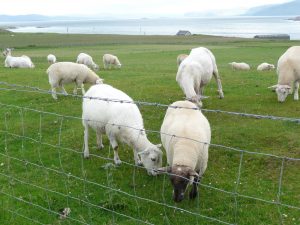 By Lilly Lewin
By Lilly Lewin
This week’s lectionary readings move us from the resurrection story back to the gospel of John.
In John 10:1-10 we are called to reflect on Jesus as the Gate and invited to look at ourselves as sheep.
Many of us in America don’t grow up around sheep so often being told we are like sheep doesn’t help us. Most of us have never spent any time with them. When I was in 7th grade, my family moved to the farm from the suburbs. My dad thought it would be good for us to learn about farming and farm animals. I like to say that he wanted us to be the 1890’s farm family, and live off the land way before it was retro and cool to do so. The first couple of years we lived on the farm we had a sheep named Sally. Sally was my first introduction to what sheep are like, and she gave me a real-life picture of how sheep behave, and why I am too often really like a sheep. I learned that sheep’s makes it easy for a predator like a coyote to grab on to the sheep and drag it down to kill it. Sheep really do need protection. They need a shepherd and a sheepfold or pen to protect them from harm. When Sally felt threatened, like after she her had twin lambs, and she thought I might harm them, Sally would snort and stomp her foot at me. That was her only defense, stomping her foot and giving a snort. That was her way of saying “just stop right there.” I realized that I’m a lot like Sally. Too often I snort and stomp my foot at God when I don’t like what God is up to or when I don’t understand it
Too many of us live in the city or in the suburbs, so we miss the symbolism of the sheep, and of gates too. We might have a front gate or a back gate in and out of the yard, but many of us don’t even have that around our homes. We just go to the door, or walk down a walkway or hallway in an apartment building with not a gate in sight. So it takes some work to think about gates, and sheep and shepherds.
What about you? What do you know about sheep? Have you ever felt like a sheep? Do you ever feel like my sheep Sally?
This past Sunday, at our thinplace gathering, we used John 10:1-10 (this Sunday’s gospel reading) for our lectio divina, and we prayed the psalm 23 as our opening prayer. In preparation for this Sunday, or if you don’t follow the lectionary readings, take some time to consider John 10:1-10 and read and listen to Psalm 23 on your own, with your family, or roommates or small group and give yourself time to ponder Jesus as a gate and yourself as a sheep who hears his voice..
The process we use is listening to the gospel passage read aloud in three different voices. If you are doing this on your own, just read slowly and allow the Holy Spirit to highlight a word or phrase for you. What pops out to you? What do you notice that you didn’t notice before?
Lectio divina, or divine listening, is a practice that allows us to hear a familiar scripture passage in a new way, with new ears. We hear new things, and allow the Holy Spirit to highlight the scripture passage for us for today. Yes, we bring to the hearing what we have learned and known before, but the idea is to allow God to speak to us today and impact us right now. What does this passage mean for me today? What is the Holy Spirit revealing to me right now, not from my years of sermons or teachings I have heard or led? But rather, what is my gift from God in this passage? What is my response? How is God asking me to respond? I often ask the Holy Spirit to act as yellow highlighting pen/marker as I read or listen, and make marks on the page, circle words and write down questions that come up as I listen to a passage. And since I am a visual learner and an artist, I think about the images and picture myself in the story. Listen to the passage and let it speak to you for today.
Read John 10:1-10 and Psalm 23
Use Psalm23 and/ or the Gospel passage as your inspiration to write or to create art. Allow the Holy Spirit to inspire you! You can use the questions that follow as guides for your journaling and for art.
John 10:1-10
Jesus said, “Very truly, I tell you, anyone who does not enter the sheepfold by the gate but climbs in by another way is a thief and a bandit. The one who enters by the gate is the shepherd of the sheep. The gatekeeper opens the gate for him, and the sheep hear his voice. He calls his own sheep by name and leads them out. When he has brought out all his own, he goes ahead of them, and the sheep follow him because they know his voice. They will not follow a stranger, but they will run from him because they do not know the voice of strangers.” Jesus used this figure of speech with them, but they did not understand what he was saying to them.
So again Jesus said to them, “Very truly, I tell you, I am the gate for the sheep. All who came before me are thieves and bandits; but the sheep did not listen to them. I am the gate. Whoever enters by me will be saved, and will come in and go out and find pasture. The thief comes only to steal and kill and destroy. I came that they may have life, and have it abundantly.”
John 10:1-10 The Message
10 1-5 “Let me set this before you as plainly as I can. If a person climbs over or through the fence of a sheep pen instead of going through the gate, you know he’s up to no good—a sheep rustler! The shepherd walks right up to the gate. The gatekeeper opens the gate to him and the sheep recognize his voice. He calls his own sheep by name and leads them out. When he gets them all out, he leads them and they follow because they are familiar with his voice. They won’t follow a stranger’s voice but will scatter because they aren’t used to the sound of it.”
6-10 Jesus told this simple story, but they had no idea what he was talking about. So he tried again. “I’ll be explicit, then. I am the Gate for the sheep. All those others are up to no good—sheep stealers, every one of them. But the sheep didn’t listen to them. I am the Gate. Anyone who goes through me will be cared for—will freely go in and out, and find pasture. A thief is only there to steal and kill and destroy. I came so they can have real and eternal life, more and better life than they ever dreamed of.
Things to Consider while Journaling
*How has God been your shepherd or your gate?
*What thieves or bandits are robbing you of peace or joy in your life? What sheep rustlers are stealing from you?
*What things help you know God’s voice? Or Jesus’ voice? When and How do you feel closest to God?
*How does it feel to know that Jesus knows your name? What would it take for you to truly believe this?
*What is abundant life to you? What does abundant life look like?
*How do you need Jesus to be a gate in your life right now?
*How do you need his protection? His care? Or Does the Gate need to swing open in some way for you right now?
As you open and close gates in your life this week and in the days and weeks to come, or if you happen to have sheep in your life, allow Jesus to speak to you through these things. And take time to listen for the voice of the Shepherd.
Check out these two videos from youtube…one is on the shepherd calling his sheep and the other is an interesting look at psalm 23.
https://www.youtube.com/watch?v=e45dVgWgV64 Sheep know their the shepherd
https://www.youtube.com/watch?v=8z_1dING_uI Rabbi on Psalm 23
Learn more about Lectio Divina https://en.wikipedia.org/wiki/Lectio_Divina
freerangeworship.com 
